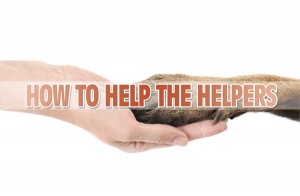How To Help The Helpers
Click here to read the complete article
444 – January/February, 2022
 By Sandy Weaver
By Sandy Weaver
If the past two years were a phenomenon, they’d be a natural disaster. Unpredicted, unpredictable, and unsettling, and it’s unknown what “normal” will look like or when it’ll finally show up.
One of the wonderful aspects of the last 24 months is the way people have stepped up to help each other. Some of the best traits of humanity have been showcased as essential workers squared their shoulders and faced the unknown with resoluteness. Doctors, dentists, nurses, and hospital workers–both human and veterinary–took precautions to keep themselves as healthy as possible while caring for their patients. Police, firefighters, EMTs, teachers, grocery store clerks and a multitude of other public-facing, necessary workers did the same.
There are many kinds of disasters–a long pandemic is one, as well as things that hit out of the blue, like fires, windstorms, earthquakes and even a bad fall in the show ring–that point out opportunities to plan better. The first responders are there to help, and those who have planned and prepared well are the ones who have an easier time getting through the disaster. Your dogs can’t let themselves in and out, can’t feed themselves or medicate themselves, and if you’re suddenly unable to care for them because of a disaster, can they survive? Will the people who are willing to help know what to do?
Here are a few things to think about and put into practice now, if you haven’t already, so you can help the helpers help your dogs:
1. Label every dog. Put their name on their run or crate and write their name on their collar. Write their microchip number on their AKC papers, kept in a file with their name on the tab. In that file, include pet insurance policy numbers, vet receipts, the food they eat, how much and at what time, a list of any medications they’re taking, including the time(s) each day they take it, and a color photo of the dog. Scan everything and store the results on a thumb drive so you can carry all this info with you when you travel without risk to the originals. You might also want to store the soft copies in the cloud, if you use cloud storage.
Click here to read the complete article
444 – January/February, 2022

Short URL: http://caninechronicle.com/?p=221789
Comments are closed











